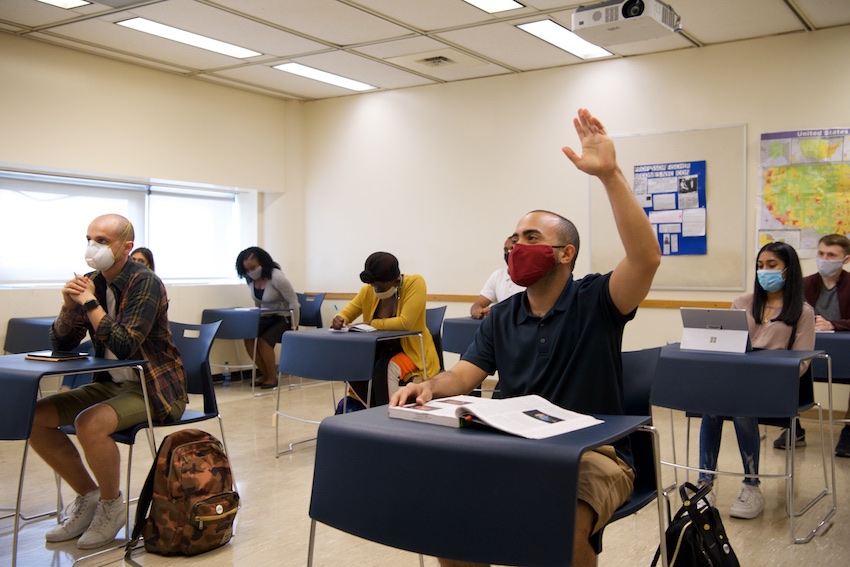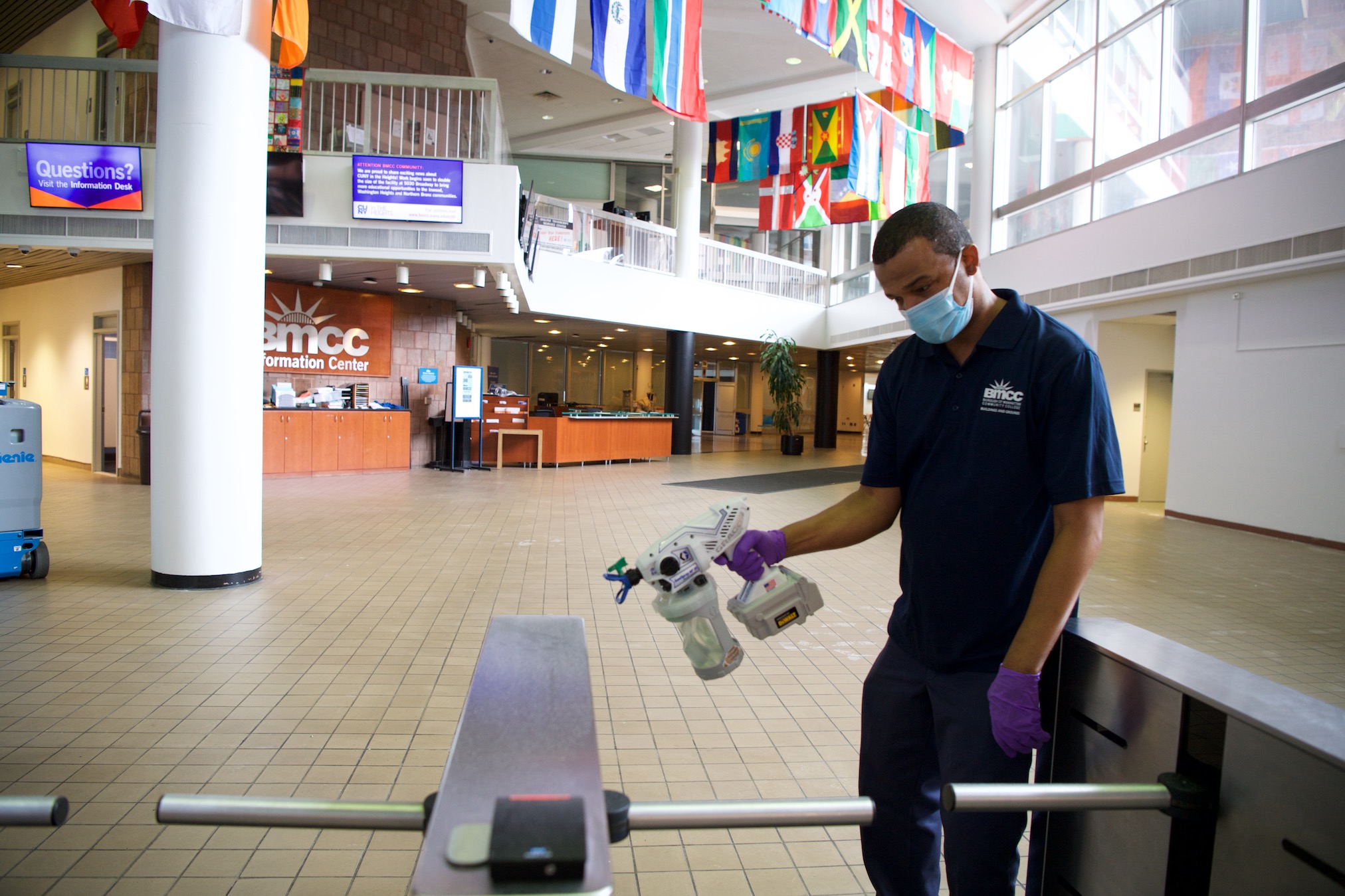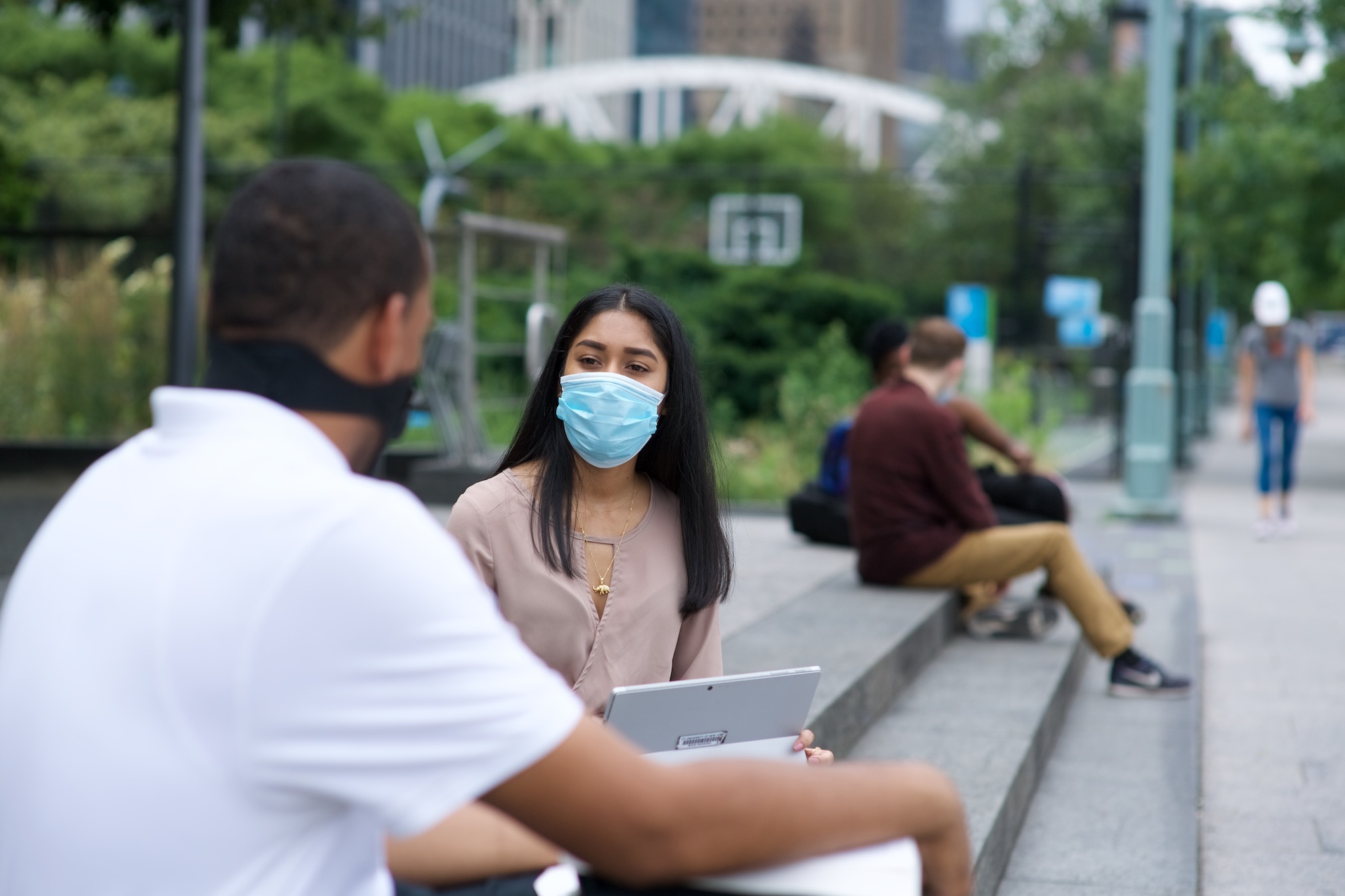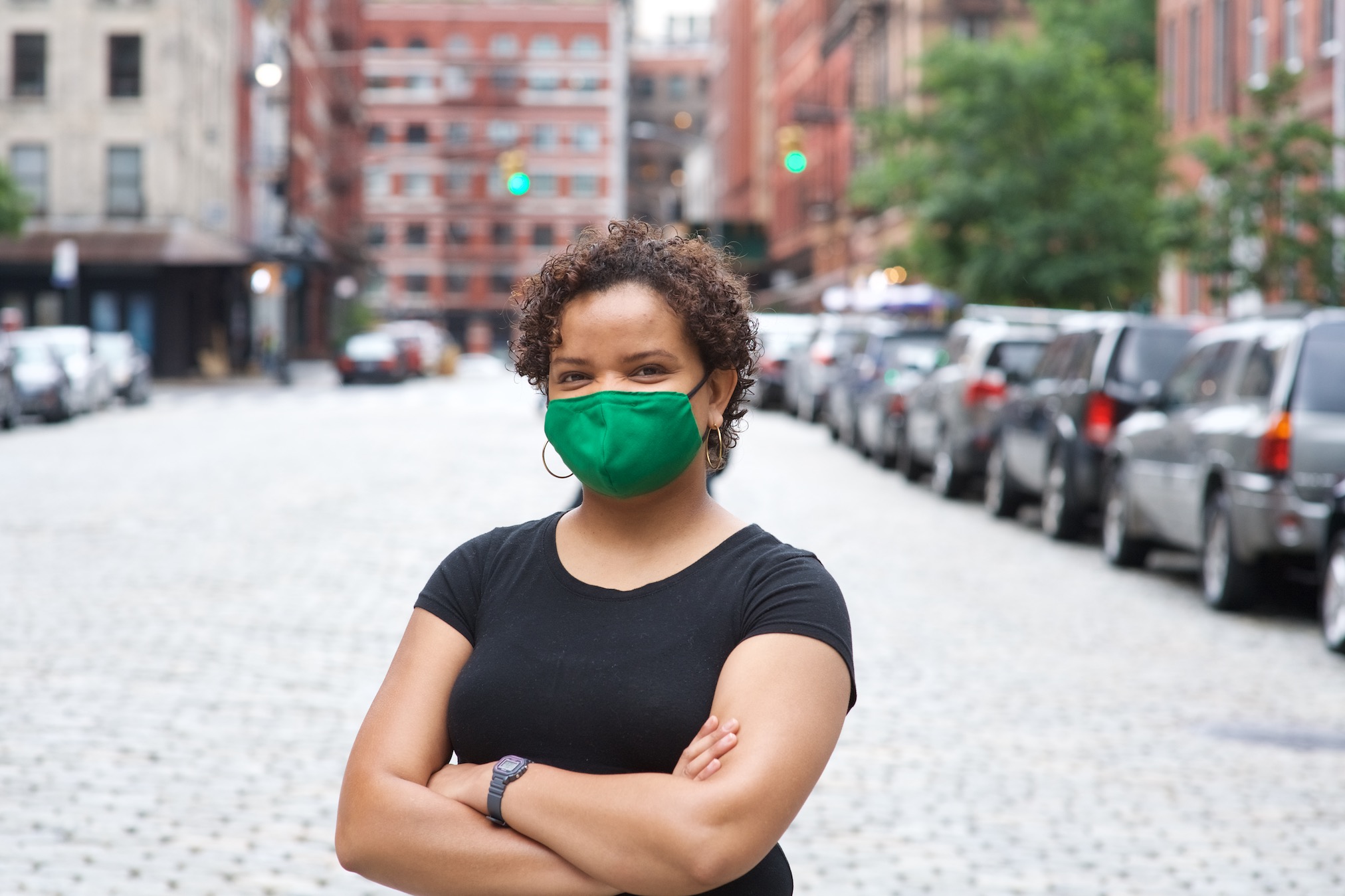
August 27, 2020
On August 26 and 27, “Welcome to Fall 2020” webinars co-hosted by Student Affairs, Academic Affairs and Public Affairs at Borough of Manhattan Community College (BMCC/CUNY) presented an overview of services, academic resources and safety protocols at the college — all designed to meet the needs of students who are starting in a semester in which 98.9 percent of the courses are only available online.
The webinar sessions also validated the work faculty and staff have done to support student success since the coronavirus pandemic necessitated the closing of campus and sudden shift to a virtual college environment in March 2020.
“What a journey it has been,” said BMCC Interim President Karrin E. Wilks in her opening remarks. “I want to thank you all for your commitment, your compassion and your creativity as we abruptly shifted all instruction and support services last March to delivering from a distance. One day we had about 11 percent of our sections online and five days later, everything was being delivered online.”
The shift to distance learning in Spring 2020 coincided with a series of highly publicized murders of unarmed Black people by police and white vigilantes — and public response, both nationally and internationally, of historic proportions.
“Amidst a ravishing public health crisis, the related economic devastation, the unrelenting, systemic racism that we are observing and so many are experiencing, BMCC has stayed strong,” said Wilks. “We stayed strong because of our commitment to each other, our commitment to community, and most importantly, because of our unwavering commitment to our mission to improving student success and to advancing equity.”
She acknowledged the work of more than 1,000 faculty and staff who helped move BMCC through a just-completed, two-year strategic planning process designed to advance equity and close outcome gaps for all students. “The first year was dedicated to deeply analyzing the factors that affect student success, and now we know what it takes to clear the path to completion. The second year was about developing actions to take what works to scale, to continue to dramatically improve student success.”
In the last six years, Wilks said, these college-wide efforts have improved three-year graduation rates and reduced equity gaps at BMCC; particularly for Black and Hispanic males and for Hispanic women students, whose three-year graduation rate — for the first time — is higher than the overall rate and higher than that of their white counterparts.
These outcomes and this unified vision “has led to one of our greatest points of pride, the fact that we’re now a top ten community college in the nation, a top ten finalist for the Aspen Prize,” Wilks said, adding that the Aspen Prize site visit on September 29, 30 and October 1 will include BMCC constituents who “deeply understand our student success work and how we’ve been successful in improving student success and advancing equity.”
“The world has changed forever.”
As Wilks continued her remarks, she pointed out that since March, “BMCC has moved from emergency response mode to a more strategic implementation of online teaching, learning, support and operations. We have a great opportunity here to really think about what it means to be a leading community college in a virtual context.
 The world has “changed forever,” she said. “It’s unlikely that we’ll go back to completely face-to-face courses, certainly not in the spring and probably not ever. In this time of change, how do we make sure that we stay the community — in terms of our values — that we want to be and that we need to be for each other?”
The world has “changed forever,” she said. “It’s unlikely that we’ll go back to completely face-to-face courses, certainly not in the spring and probably not ever. In this time of change, how do we make sure that we stay the community — in terms of our values — that we want to be and that we need to be for each other?”
Part of the answer to these questions lies in viewing this period of time, Wilks said, “as a great opportunity to really think about research and conduct a kind of an open lab, if you will, in terms of how we move forward as the best college we can possibly be in this virtual environment.”
Now passing the torch to President Designee Anthony Munroe, Wilks closed her comments by thanking the BMCC community she has worked alongside as interim president and before that, as provost.
“It’s wonderful to see all of you here, even virtually,” she said. “As we live in the ‘zoom world,’ it’s so important that we connect, that we talk to each other, that we take care of each other. I wish you the very best in this semester; a healthy, safe, productive semester, one in which we learn a lot, and in which we deeply engage with each other to be the very best community college we can be. Thank you again, so much, for your commitment and your contributions.”
Reimagining services, so students feel welcome
Vice President for Student Affairs Marva Craig situated the emotional tenor of recent semesters.
“From the spring to the fall, it was like one contiguous semester,” she said. “More than ever, faculty had to remain in the game over the summer. So, this semester, I will not welcome the faculty back to the fall semester — I will simply say, welcome to this event.”
Staff members, Craig said, are also impacted by the changes due to remote employment. “One day flows into the next … it does not matter what day it is; they too are revisiting how to serve students at a distance.”
She described the disorientation that the pandemic has brought. “We return this fall to a city with a ravaged economy and a city that many of use haven’t even seen, because we haven’t returned to Manhattan. We return to a university that is transforming itself. We return to a college that is in the process of reimagining who we are, but one thing that has not changed is that our students remain majority Black and Hispanic, and economically disadvantaged.”
Coming from communities that are experiencing the worst of the pandemic, “Our students work in industries that are most impacted, and they are the last ones hired. Having no food is real to them,” Craig said. “Our students are learning at a distance, a learning experience that was not of their choosing. They want to be back in the classroom. Our students are resilient. They want a college education. They want to make a difference in their lives and their families.”
BMCC students also continue to watch as Blacks and Hispanics are murdered or suffer long-term injury at the hands of the police, she said, citing the August 23 incident in Kenosha Wisconsin where Jacob Blake, 29, was shot seven times in the back by police as his young children looked on. “This was only a few days before the start of the fall semester,” said Craig. “Students will come to us feeling the pain of a wound that just won’t heal.”
Taking these things into account, the Division of Student Affairs continually assesses student needs, wants and experiences.
“We have reimagined our services for our students to feel welcome,” said Craig. “We created Zoom Hours, Monday through Thursday from 10 a.m. until 11 a.m.; from 2 p.m. until 3 p.m. and from 6 until 7 p.m. This is so our students can stop in; they can see our faces, they can talk to a live human being.”
Craig also talked about the new BMCC Ambassadors for Safety and Health or BASH program, which provides students with work-study employment and training to take back to their communities.
“We should revise our language, change how we share our information and we should consider the platform on which we are sharing, the timeline we’re using,” she said. “We are asking that faculty and staff share ideas with us, attend our events, ask questions, directly see what students experience, so when we encourage them to participate, we will be doing so armed with first-hand experience.”
This fall semester, Craig said, “We will be learning, we will be teaching and seeking help from our peers and showing flexibility and willingness to change, as we welcome and serve our students.”
Next up in the webinar, Assistant Vice President for Campus Planning and Facilities Jorge E. Yafar went over the safety and health protocols that BMCC has put in place in order to keep functioning an institution.
These include having put in place a detailed BMCC Reopening and Operations Plan coordinated with State and City Departments of Health, creating a Campus Reopening Committee, establishing and promoting health monitoring measures, adapting facility operations, creating COVID-19 Student Conduct and employee protocols, setting up Coronavirus Campus Liaisons and more.
Services that continue their mission in a virtual format
The webinar also presented brief overviews from a number of BMCC staff members.
Director of Single Stop in the Office of Student Affairs Deborah Harte went over the Emergency Grants for students, including the Petrie Grant up to $1,500 and the BMCC Foundation Grant up to $600. These grants enable students to stay connected to their studies when extenuating circumstances such as homelessness impact on them.
 Director of Counseling, Department of Student Life Neda Hajizadeh talked about the BMCC Counseling Center that provides workshops and mental health support for students, in order to help maintain their academic success.
Director of Counseling, Department of Student Life Neda Hajizadeh talked about the BMCC Counseling Center that provides workshops and mental health support for students, in order to help maintain their academic success.
Director of Health Services Penelope Jordan reviewed guidelines for preventing the transmission of COVID-19, as well as where to get tested, such as City MD, NYC Health and Hospital Corporation, RiteAid, and Lehman and Medgar Evers College. She also presented information about the Isolation Hotel Program, which provides housing for individuals who have tested positive for COVID-19 and are not able to social distance in their homes or live with vulnerable family household members.
Academic Advisement and Transfer Center Director Carei Thomas discussed the Center’s ways of assisting students as they develop their educational plans and apply for Out in Two Scholarships and other benefits.
Gregory Farrell, a staff member of the BMCC Learning Resource Center, gave an overview of services such as online tutoring, academic coaching, instructional computer services, and services for faculty, and Chief Librarian Kathleen Dreyer spoke on the role of the BMCC library in supporting that work.
Office of Accessibility Assistant Director Nicole Leach provided information on how faculty and staff can help students benefit from support offered by her office.
BMCC’s new president, Dr. Anthony Munroe, sets safety, community strength and student success as priorities
The last speaker of day one of the webinars was Incoming BMCC President Anthony Munroe, who reminded the participants that throughout this challenging time, they are not alone.
“We’re all in this together,” Munroe said. “My actions impact you. Your actions impact the next person. At the end of the day, it is all about our students. But in order for us to support our students and ensure their success, we have to keep one thing in mind — safety. Our safety and our health is paramount.”
That’s why the University, the BMCC reopening task force committee and members of the college community have been focused on ensuring that resources are in place to support the learning experience for all students, Munroe explained.
“That’s why the overwhelming majority of classes are being offered virtually,” he said. “That’s why the daily health screenings through the Evergreen app, which is a contact tracing app, is required — used every time entering the campus, for everyone, including myself. It’s not optional. It’s a requirement.”
While this semester “will be a very different looking, different feeling academic year,” Munroe said, “we as a nation, as a city, and as a community of educators continue to navigate through very challenging, unpredictable and unprecedented times.”
The COVID-19 public health crisis has had a significant impact on individuals, families and institutions such as BMCC, as well local and national economies, Munroe said, and noted that although recent acts of unjust violence in Black and brown communities are now in the public’s eye at levels not seen before, “social injustice has been happening for centuries.”
As BMCC functions in that social context, “I think it is incumbent on us to continue the fight to ensure that there’s not only equity, but that there is human dignity in how we interact with each other,” he said.
On a personal note, “As a father of two young boys, it pains me to see all that is happening in this country,” Munroe shared. “Whether it’s in Wisconsin, Chicago, New York City or anywhere else, it’s unacceptable — and we have a role to play in this regard.”
Referring to session participants’ comments that “spoke to the resilience of our students and that of our faculty and staff, we have to make sure we take care of each other and ourselves, as well,” Munroe said. “No person should feel like they are isolated or in this struggle by themselves. I’m encouraged to hear about all the resources at BMCC, all the support that you have carefully designed to assist your students in their journey. At the end of the day, it’s all about our students.”
Munroe closed his comments by thanking Interim President Karrin E. Wilks for her commitment and service to BMCC, as well as thanking the cabinet, faculty and staff “who continue to work tirelessly so that our students can be successful.”
Munroe praised the “groundbreaking research our faculty are involved in, and our students; their diversity. They are phenomenal. We are helping them along a path and that’s an honor and a privilege to do that.”
At BMCC, Munroe said, “We have a tremendous opportunity to assist our students in achieving their goals. We have an opportunity and a duty to help our city through our innovation and workforce development programs. Our students need education that is affordable, successful — and for some, that help move them right into the workforce.”
Strategic planning, he said, “never ends. We will continue to build upon our strategic plan and continue to be a beacon of hope for our students and our community. Out of this crisis we will continue to rise. BMCC will continue to be a national leader who is totally focused on our students.”
“Honoring the work that has gotten us here.”
Associate Dean of Faculty Jim Berg opened Day Two of the Welcome to Fall 2020 webinars.
“We focused yesterday’s session on how faculty and staff can help students access college programs and services that support students’ well-being,” he said. “Even as that was the official theme of the day, several speakers also noted that it is important that we take care of ourselves and support one another.”
 Sessions on Day Two would focus on the support available to faculty, Berg said, “but first I want to acknowledge what we are going through right now and honor the work that it has taken for each of us to get here. As a city, as a community and as a college we have experienced tremendous loss.”
Sessions on Day Two would focus on the support available to faculty, Berg said, “but first I want to acknowledge what we are going through right now and honor the work that it has taken for each of us to get here. As a city, as a community and as a college we have experienced tremendous loss.”
The trauma of COVID-19 “has resulted in the loss of life, the loss of jobs and income, the loss of homes,” he said. “It is important to acknowledge that we have all experienced that trauma and that it comes in the context of trauma suffered for generations due to structural inequality and systemic racism. The violence against communities of color continues and it is staggering.”
Berg went on praise the work BMCC faculty and staff have done to engage students at the start of their semester this week. “You have spent countless hours learning to work in a Zoom room,” he said, “revising your syllabi to allow for regular check-ins with students, and figuring out how to provide services at a distance.”
Office of Academic Affairs Assistant Dean for Academic Support Services Janice Zummo and Early Alert Specialist John Huie picked up the thread by presenting information on technology tools for faculty to help them communicate with their students, once in class.
Connect2Success, powered by Starfish, she said, connects students to their “success network” — faculty, advisors and support staff. Progress reports that are generated at the middle and end of a semester, and help faculty communicate with students at these critical points.
Academic Literacy and Linguistic Professor Cynthia Wiseman also talked about automated systems that facilitate communication around student progress, both red flags and kudos.
Vice President for Enrollment Management Diane Walleser spoke next, describing the technology that links students, faculty and staff in the enrollment process. These technologies, which provide student guidance, coordinate faculty and staff, and present analytics, are rolling out this semester and into Spring 2020.
CETLS Director Gina Cherry spoke on staff development activities that support faculty engaged in remote teaching and learning, and Associate Professor and Open Knowledge Librarian Jean Armaral highlighted the library as a pedagogical partner to faculty, a resource as they guide students through research assignments and other activities.
She invited faculty to join the library staff as they promote use of Open Educational Resources (OER) and Zero Textbook Cost (ZTC) courses at BMCC — both important in building access and equity at the college.
Associate Director of E-Learning and Digital Education Tom Harbison reviewed services and programs for faculty, including ongoing support and workshops in Blackboard, Zoom, VoiceThread and other platforms.
Service Desk Manager Luis Messon went over hours of operation for phone support and the kind of support the Service Desk can provide, such as enabling access to the H drive, which staff can use to share working documents.
Internships and Experiential LearningDirector Sharon Reid explained how experiential learning, service learning, civic engagements and even internships can be completed as a virtual experience for students.
Center for Career Development Director Christopher Thunberg talked about services including one-on-one advising with career planning and job search, job fairs, speaker panels and professional development workshops, all of which are available online.
Office of Student Affairs Assistant Director of Student Activities and Civic Involvement Kayla Maryles reviewed the Co-Curricular Transcript, which enables BMCC students to receive documentation on their official transcript of approved community engagement activities.
“We’re going to repurpose ourselves.”
Quoting Shakespeare’s “Hamlet” BMCC Provost Erwin Wong said although “time is out of joint,” we’re going to set it right. “We’re going to repurpose ourselves. We’re going back, but we’re looking to the future.”
Presenters from both days of the sessions “have given us plenty to think about in terms of how we’re going to help our students succeed, because that’s our mission, and how to do it in a new and intelligent way,” said Wong.
He added that the webinar attendees, BMCC faculty and staff in general, “were hired because you are the best and the brightest, that goes without saying. But what’s also important is that you have a particular BMCC DNA in you, because all of you care about the students. You want them to succeed both in the classroom as well as outside the classroom — and you always find a way to make that happen.”
There are going to be challenges in the fall semester and moving forward, Wong said, “but together we will be successful, and when COVID-19 finally vanishes, we are going to be stronger for it. The students are going to benefit from what you are doing and we will continue to be no less than the best in CUNY.”
To view the webinars in their entirety, click here for Day One and click here for Day Two.
STORY HIGHLIGHTS
- Two days of webinars highlight services, resources and programs to support student success and faculty as they embark on another online semester
- CETLS, E-Learning, the BMCC Library, Career Center, Enrollment Services and academic support units are among highlighted programs
- Interim President Karrin E. Wilks and Incoming President Anthony Munroe frame direction BMCC is heading, with student success at the forefront

